|
|
|
Sort Order |
|
|
|
Items / Page
|
|
|
|
|
|
|
| Srl | Item |
| 1 |
ID:
185581
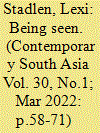

|
|
|
|
|
| Summary/Abstract |
Through an ethnographic focus on a Muslim village in rural West Bengal, this article explores how a group of women have come to defy gendered socio-cultural and locally rooted religious interpretations to become the bureaucratic and political gatekeepers within their community. The wider climate for Muslim men at this moment across India, the characteristics of bureaucratic spaces themselves and the perceived necessity of this kind of work for the most marginal are all identified as facilitating this shift. Yet in addition to these factors, this article will claim that the women themselves are wilfully utilising these encounters in order to become seen by the organs and actors of the local Indian state. It is not simple recognition they are after, nor to be considered as bureaucratic or political insiders, but rather to be seen on their own terms in diverse and context dependant ways that are ultimately of their choosing. As such, this shorkārī kāj or political work has become a central part of their daily lives and identities, to which it is suggested that their attributes and experiences as women may make them particularly well suited.
|
|
|
|
|
|
|
|
|
|
|
|
|
|
|
|
| 2 |
ID:
185579
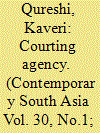

|
|
|
|
|
| Summary/Abstract |
Sharia councils have been in existence in England since the 1980s, providing advice and guidance in matters of Islamic family law. The vast majority of their users are women applying for Islamic divorces. The ulamā (scholars) at the councils encourage reconciliation and only grant divorces where this is deemed impossible. This paper, based on observations at a large sharia council in East London, supplements earlier institutional analyses by focusing not on what the ulamā are doing, but on what women are doing at the council. The paper identifies a spectrum of compliance with the council and its procedures, ranging between those who say they just want what the sharia wants, to foot-dragging, actively contesting the ulamā and exiting the council. Further, these forms of engagement may change over time. Overall, the paper contributes by illustrating the complexity of British South Asian Muslim women’s identities and affiliations and engaging with questions of gendered agency. It is clear that even when women petitioners contest, confront or exit the council, they may inscribe their moves within, rather than in opposition to, Islamic norms and values. The paper draws out the wider political implications of this non-opposition between Islamic subject positions and agency.
|
|
|
|
|
|
|
|
|
|
|
|
|
|
|
|
| 3 |
ID:
185584
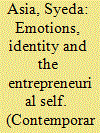

|
|
|
|
|
| Summary/Abstract |
This article explores the relationship between emotions, identity and work in the narratives of Muslim women in rural Jhunjhunu, Rajasthan, India. The article uses an in-depth account of two families where all women engage in income generating work. The women experience complex challenges, struggles and negotiations, and they make remarkable decisions in resolution. The role their emotions play in their decisions articulates an entrepreneurial self that offers a newer interpretation of the relationship between emotions, identity and work. By detailing their struggles, negotiations and remarkable decisions, this article attempts to move towards a sociology of hope that marks the spirit of these women in overcoming the constraints in their everyday.
|
|
|
|
|
|
|
|
|
|
|
|
|
|
|
|
| 4 |
ID:
185582
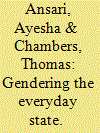

|
|
|
|
|
| Summary/Abstract |
This ethnographic article focuses on interactions between poor Muslim women, various intermediaries/brokers, and the Indian state. The article illustrates the complexities of claim-making and the forms of subjugation/marginalisation Muslim women experience when attempting to access resources, documents or paperwork. Contrary, however, to many representations of Muslim women’s engagements with the state, we also draw out agentive aspects as women hustle and negotiate to make claims and assert citizenship rights. Outcomes are variegated but also incorporate some women in brokerage roles, challenging assumptions regarding state/people mediation in India which foregrounds male brokers. The empirical detail is situated in a theoretical context incorporating gendered distinctions between shifting imaginaries of ‘nation’ and lived experiences of the ‘everyday state’. In a context where ‘nation’ has been evoked and articulated as a feminine form – through evocations of mata (mother) – we show how shifts towards a masculine imaginary, symbolised within Hindu-nationalist discourses, impacts Muslim women’s subjective experiences. We also illustrate that, whilst gendered imaginaries of ‘the nation’ are shifting, the ‘everyday state’ has long been experienced as a masculinised formation. Here we show how embodied involvements with the everyday state were constituted through gendered bureaucratic histories, spatial configurations, urban cosmologies and broader ideologies.
|
|
|
|
|
|
|
|
|
|
|
|
|
|
|
|
| 5 |
ID:
185583
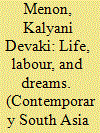

|
|
|
|
|
| Summary/Abstract |
The many Muslim women who make up India’s burgeoning informal economy, challenge any attempt to reduce them to homemakers whose lives are delimited by culture and religion. An examination of their lives reveals the complex forces that shape their worlds, and illuminates how they variously negotiate landscapes of inequality in contemporary India. Here I focus on the biography of one Muslim widow to illustrate how she labours to live and dream in contemporary India as various social forces intersect to create precarity in her life. While neoliberal priorities and a shrinking social safety-net affect underprivileged women across religious lines, the intersection of gender, class, and religion in Hindu majoritarian India has made it even more challenging for low-income Muslim women like her to make ends meet. However, dominant forces are not totalising, and the biographical method reveals how one woman negotiates precarity, employing various skills as she adapts to changing conditions, juggling multiple jobs to meet expenses, and envisioning a better future. We see not just the deep inequalities that create precarity for some, but also how dreams can be a material force in the world.
|
|
|
|
|
|
|
|
|
|
|
|
|
|
|
|
| 6 |
ID:
185585
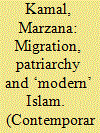

|
|
|
|
|
| Summary/Abstract |
Male labour migration can both empower and disempower non-migrating, or left behind, wives – contingent on further distinctions of rural–urban, nuclear-extended households and of class, religion and educational background. Migration catalyses transformations in the gender and religious norms in rural northern Bangladesh. It entrenches patriarchal norms and helps to reinforce the practices of ‘modern’ Islam – by creating the identity of ‘respected’ housewife, a woman who stays home, takes care of her in-laws and wears the burqà – that works within the codes of enhanced classic patriarchy. These patriarchal norms and practices dampen women’s agency through patriarchal codes – constituted of the power relations between mothers-in-law and daughters-in-law, restrictions on the physical autonomy of women and women’s dependency on their male kin. In-laws, and the assistance of natal kin, curtail women’s decision-making power. This curtailment serves, ultimately, to sustain the power the in-laws and natal kin exercise over the women.
|
|
|
|
|
|
|
|
|
|
|
|
|
|
|
|
| 7 |
ID:
185578
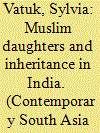

|
|
|
|
|
| Summary/Abstract |
Islamic law gives women shares in the estate of a deceased parent, husband, and certain other relatives. However, in India they rarely obtain the inheritance shares to which they are entitled. When the time comes, they typically either waive their inheritance rights or are prevented by their male co-heirs from accessing them. Those who assert a claim to their shares find themselves vilified by their natal kin and by society at large, as greedy, grasping, selfish, unwomanly and lacking in family feeling. They are often even ostracized by their brothers, sisters-in-law, and other family members. Drawing upon data from interviews conducted in Delhi in 2011, I explore this gap in India between Islamic law and actual practice, with specific reference to a Muslim daughter’s right to inherit natal property.
|
|
|
|
|
|
|
|
|
|
|
|
|
|
|
|
| 8 |
ID:
185580
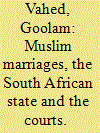

|
|
|
|
|
| Summary/Abstract |
A central feature of South Africa's legal system under white minority rule was the state's institutionalisation of racist structures and a distinct Christian bias in religious matters. Muslim marriages were not recognised because they permitted polygamy. Majority rule in 1994 resulted in the adoption of a new constitution that recognised non-Christian and ‘non-European' beliefs and practices, and some Muslims lobbied for the legal recognition of Muslim marriages. While the new political context was sympathetic to accommodating multicultural practices, legislation stalled because of differences among Muslims over what constitutes Muslim Personal Law (MPL). This article focuses on debates in South Africa on state governance of Muslim family law and how, in the void created by the absence of legislation, the country’s courts have seized the initiative through ex-post facto recognition of the consequences of Muslim marriages. South Africa thus represents a peculiar case of the courts recognising the consequences of Islamic marriages, even while Parliament has failed to write this into law. As such, South Africa provides a stark contrast to many other countries where there is acrimonious debate over legal pluralism and, in particular, accommodating MPL.
|
|
|
|
|
|
|
|
|
|
|
|
|
|
|
|
| 9 |
ID:
185576
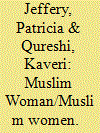

|
|
|
|
|
| Summary/Abstract |
Images of the ‘Muslim Woman’ – passive, cloistered, and oppressed – have a long and inglorious history and have often been deployed in wider political debates in South Asia and beyond. The ground realities, however, tell a different story: there is no such person as the ‘Muslim Woman’ and this Special Issue presents papers that highlight the diversity of Muslim women’s lives within South Asia and among Muslim women of South Asian heritage in the diaspora. Muslim women often live in economic and political contexts that are hostile to their wellbeing and their experiences are also shot through with their own intersecting identities – region and residence, class, educational and employment opportunities, marital status, stage in the life course, and so forth. Our contributors focus on different arenas to highlight the diverse complexities faced by Muslim women grappling with the exigencies of daily life: engagements with the legal system in relation to marriage and inheritance; performing ‘claims work’ in order to obtain their entitlements from the state; involvement in income-generating work; and the impact of male outmigration on ‘left-behind’ wives.
|
|
|
|
|
|
|
|
|
|
|
|
|
|
|
|
|
|
|
|
|